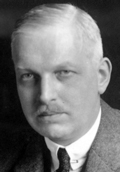 |
Wilhelm Carl Josef Cuno
b. 2 Jul 1876, Suhl
d. 3 Jan 1933, Aumühle bei Hamburg |
| Title: |
Reichskanzler (Reich Chancellor) |
| Term: |
22 Nov 1922 - 13 Aug 1923 |
| Chronology: |
22 Nov 1922,
appointed, order issued by the Reich President on 22 Nov 1922
[1] |
| |
12 Aug 1923, resignation submitted to the Reich President, accepted pending the appointment of a successor [2] |
| |
13 Aug 1923,
discharged, order issued by the Reich President on 13 Aug 1923
[3] |
| Biography: |
| Received education as a lawyer in Berlin and Heidelberg; received a doctorate in law (1907); was employed as advisor by the Reich Treasury Department in 1910; during World War I he was involved in arrangements for food supplies for the German army, but quit civil service to join the board of directors in the Hapag shipping company in 1917; promoted to the Hapag's general director (1918); as an economic expert, participated in the post-war negotiations on reparations and peace terms; the importance of his position as Hapag executive increased after the company became one of the leading shippers of goods between the U.S. and Germany; informally represented the interests of the Reich government abroad; rejected several proposals to assume the post of foreign minister, but agreed to form the Cabinet after the resignation of Joseph Wirth; was appointed Reich Chancellor (22 Nov 1922 - 13 Aug 1923) and formed a government mostly composed of non-party economists and members of the German People's Party (Deutsche Volkspartei), Democratic Party (Deutsche Demokratische Partei), Centre Party (Deutsche Zentrumspartei) and Bavarian People's Party (Bayerische Volkspartei); the crucial event of his administration was the Ruhr crisis, which broke out after the French and Belgian armed forces occupied the Ruhr in January 1923 to secure reparation payments; called for "passive resistance" in the Reichstag (13 Jan 1923), but within half a year German economy virtually collapsed; under the circumstances of enormous inflation rates and workers' strikes, the Reichstag withdrew its support from the government; resigned on 12 Aug 1922; after the downfall of his government, he retired from politics and returned to the management of Hapag. |
| Biographical sources: Akten der Reichskanzlei: Weimarer Republik. Das Kabinett Cuno (Boppard am Rhein: Boldt, 1968) |
| |
| [1] |
Bundesarchiv, R 43 I/2915, fl. 3. |
| [2] |
Akten der Reichskanzlei: Weimarer Republik. Die Kabinette Stresemann I u. II (Boppard am Rhein: Boldt, 1978), Band 1, S. XXI-XXII: "Am 12. August 1923 um 21.45 Uhr wurde das Rücktrittsgesuch des Reichskanzlers Cuno dem Reichspräsidenten überbracht. Etwa zur gleichen Zeit erteilte dieser dem Vorsitzenden der Deutschen Volkspartei Gustav Stresemann den Auftrag zur Regierungsbildung und ernannte ihn am Abend des folgenden Tages, nachdem die Ministerliste in Grundzügen feststand, zum Reichskanzler." |
| [3] |
Bundesarchiv, R 43 I/2915, fl. 88. |

